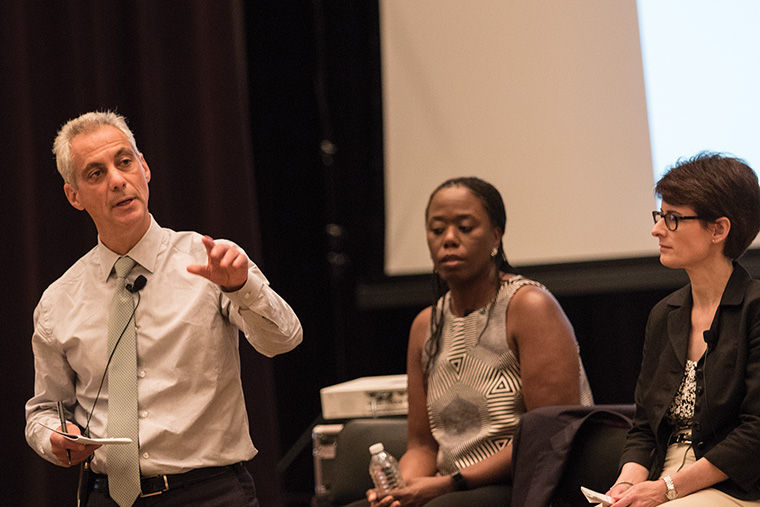Chicago speaks out on budget at mayor’s town hall forums
Mayor Rahm Emanuel listened to residents’ concerns over the city’s budget during town hall meetings the week of Aug. 31.
September 8, 2015
Surrounded by heavy security, Mayor Rahm Emanuel addressed an unwelcoming crowd at his final town hall budget meeting on Sept. 3.
Many in attendance booed Emanuel as he invited residents to voice their concerns about the city’s 2016 budget—ranging from school closings to dwindling special education resources to high taxes. Those who signed up to speak were each allowed 60 seconds to share with Emanuel how they think funds should be spent.
Three forums to discuss the budget took place in the space of a week, with the first meeting held Aug. 31 at Malcolm X College at 1900 W. Van Buren St., the second Sept. 2 at the South Shore Cultural Center at 7059 S. Shore Dr. and the third at Wilbur Wright College at 4300 N. Narragansett Ave.
Tensions rose at the second meeting, which ended early when a group of protesters on a hunger strike fighting the closure of Walter H. Dyett High School, 555 E. 51st St., swarmed the stage and police quickly escorted Emanuel out of the forum.
Jason Ware, a Dyett protester, took the stand Sept. 3, rejecting the offer Chicago Public Schools made to keep the school open, but only as an art-themed school. Ware said he did not want Dyett “opening under wrong proposals.”
The third meeting, held the night after the Dyett High School confrontation, offered greater opportunities to focus on the budget.
“Mr. Emanuel, this city doesn’t have a money problem, it has a spending problem,” one resident said.
Many expressed concern about a lack of funding for special education resources for students.
Sarah Chambers, a CPS special education teacher, brought some of her students to participate in the meeting.
“It’s always more powerful to hear students speaking,” she said.
According to Chambers, 625 special education teachers and $200 million in resources have been cut across the city.
Chambers said legally, each special education student must be allotted a certain amount of time spent with teachers, but the cuts prevent teachers from giving students the individual attention they need.
“Now we’re really pressuring him to give back the funding,” Chambers said. “We’re going to keep going to meetings to make plans on how to get the funding back. [We will] talk to aldermen, state [representatives] and possibly file a lawsuit as well.”
Many have suggested that Emanuel tax wealthier residents to make up for cuts.
Nicole Anderson, a journalism major at Wilbur Wright College, used her minute at the microphone to discuss minimum wage, which was recently increased citywide to $10 per hour. Anderson said there was a loophole in the minimum wage ordinance that allowed any government-funded organization to evade paying employees $10 an hour.
“Rahm would realize a lot of students are working for sister agencies like City Colleges of Chicago and will give us our $10 an hour,” Anderson said. “If he wants us to pay the property tax, he needs to give us more money.”
Emanuel listened and took notes during the meeting, occasionally responding to residents’ concerns because he said he did not want to hold up the meeting by responding to each.
The mayor is set to present the budget at City Hall later this month.








